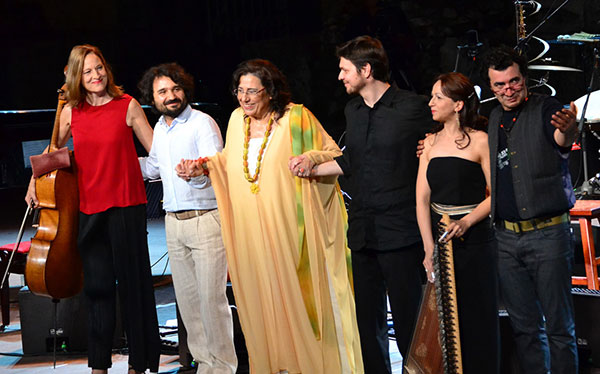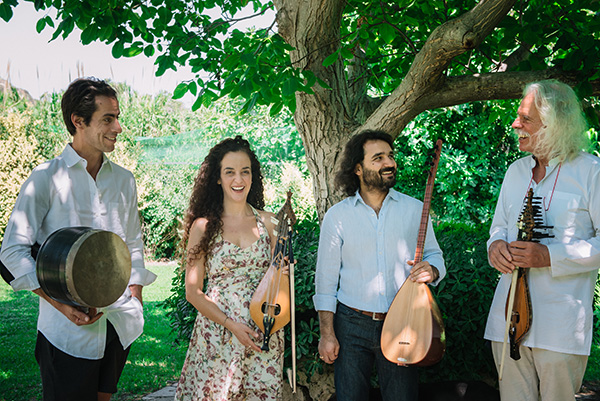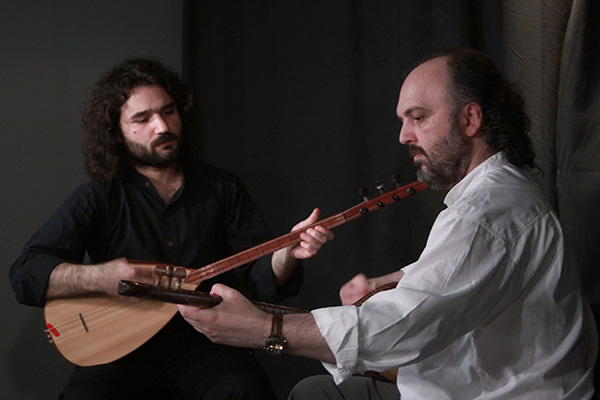
| Beyond The Borders | ||
| Cihan Türkoğlu | saz, kopuz, voice, compositions, arrangements | |
| Maria Farantouri | voice | |
| Anja Lechner | cello | |
| Meri Vardanyan | qanon | |
| Nikos Paraoulakis | ney | |
“Everything flows.
Out of one thing there comes unity,
and out of unity one thing.”
–Heraclitus
The project documented on Beyond The Borders was born when Greek singer Maria Farantouri first heard Cihan Türkoğlu, a saz virtuoso of Anatolian extraction who had been living in Athens for ten years. After proposing the idea to ECM, producer Manfred Eicher helped shape the program into its present form, debuting it as part of the 2017 Athens Festival. For this live performance, they are joined by Anja Lechner on cello, Meri Vardanyan on kanon, Christos Barbas on ney, and İzzet Kızıl on percussion. Their collective sound is distinctly individual, like a soul of many cities and eras compressed into the flesh of a single body.
Most of the songs are traditional treasures from the lands of Turkey, Armenia, Lebanon, and Greece. Each tells a story preserved by centuries of reiteration, and achieves relevance as a cool drink of water in today’s political firestorm. The scintillating arrangement of “Drama köprüsü” (The Bridge of Drama) finds both Türkoğlu and Farantouri singing the life of Hassan, a legendary Robin Hood-like figure who went rogue after slaying his superior, stealing from the rich and giving to the poor while shadowing the village just to glimpse the woman to whom he was once betrothed. The Sephardic ballad “Yo era ninya” (I Was a Girl) tells of a highborn maiden ruined by a deceitful man. A mournful quality made resolutely genuine by Farantouri’s delivery, as if sung through a cloud, makes this a standout among standouts. Lechner’s cello is remarkable, a red thread drawn through shadows of time.
From Armenia we receive “Kele kele” (Strolling), an anonymous song preserved by Komitas Vardapet around the turn of the 20th century. In it, a lovelorn girl sings: “I am dying for your footsteps, my precious.” An extended intro from Vardanyan paints a wide terrain on which to seek the traces of her loved one. Not all is so gloomy, however, as the Macedonian wedding song “Triantafylia” (Upon the Rosebush) works from a quiet introduction to an energy powerful enough to shine unscathed through a pessimistic future. “Wa Habibi” (My Beloved), a Christian hymn from Syria and Lebanon, unravels with a lifetime’s worth of experience in every throaty word.
The program is rounded out by songs written specially for Farantouri with music by Türkoğlu and words by Agathi Dimitrouka. “Dyo kosmoi mia angalia” (Embraced Worlds) takes Eros as its theme and evokes loving attributes via kanon, in which are felt reflections of sunlight upon a body of water whose surface is a portal between realms. “Ta panda rei” is a setting of Heraclitus, whose blurring of parts and wholes, of lives and life itself, yields percussive details from Kızıl and breaths from the ney of Barbas. Between “Lahtara gia zoi” (Yearning for Life), an empathic song for the uprooted, and “Anoihtos kaimos” (A Secret Yearning), a surreally uplifting dream, we feel the connective tissue of death and life as if it were the very substance of our hearts. With every beat, we get closer to this music, even as it follows its own path through the tragedies of our world.

| Göç | ||
| Cihan Türkoğlu | saz, kopuz, voice, davul, compositions | |
| Ross Daly | tarhu, Cretan lyra | |
| Kelly Thoma | Cretan lyra, soprano lyra | |
| Bijan Chemirani | percussion | |
| Nikos Paraoulakis | ney | |
| Haïg Sarikouyoumdjian | duduk | |
In ‘GÖÇ’ Turkoglu’s new compositions blend traditional music idioms from Armenia, Greece, Persia and Turkey. The compositions are performed on traditional instruments of these countries, at times in a traditional way, while others with modern techniques and harmonies.
In the recording the arrangements of an acoustic quartet resonate as a large band. Cihan by means of an intense percussion set-up architects an acoustic landscape where rich sound colors and harmonies are interwoven. This mesmerizing scenery is complemented by vocals, melodies and solos.
The album was inspired by different aspects of migration that were sculpted into musical compositions.
‘GÖÇ’ in Turkish translates to migration. In Cihan’s personal story this word has been assigned a wider meaning and a far deeper feeling; a migration of emotions, spirits, thoughts. What was envisioned was a migration in time slots, between the real and the imaginary, through a sound or even a scent, through a familiar face or a stranger. The apogee of migrations in the album being that of the eternal migration through one’s self.

| Mouhabet Project | ||
| Cihan Türkoğlu | voice, saz | |
| Periklis Papapetropoulos | voice, saz | |
Two Words about the project
Mouhabet is an influential atmosphere, a process of unity that transpires in places, such as Turkey and Greece, where oral tradition and oral lore (cultural material and tradition transmitted orally from one generation to another) existed in the past and are still kept alive until today. During Mouhabet, culture is born and handed down from one to another becoming richer throughout time, and the people drawn in to this process pass through mental & spiritual experiences.
Throughout history philosophers believed that sounds and words hid in them a Divine depth; a powerful and profound meaning. This could explain why the most dominant examples of Mouhabet can be found in music. During the unfolding of a melodious Mouhabet the people present become one, merge with the vibrations of sound and the meaning of the words. The songs performed are of a theological, philosophical, and sociological nature and are most commonly accompanied by a traditional instrument such as saz (tamburas) that has deep roots in both cultures.
The cultural, sociological and political common knowledge (knowledge that is known by everyone or nearly everyone in the two communities at hand) of Greece and Turkey, together with their differences, shape an extraordinarily unique example of the Mouhabet culture.
Unfortunately the fast track, mass-producing and consumerist culture that is becoming the norm of today has caused a dilapidation of individuals’ spiritual world. As a domino effect, the Mouhabet culture has suffered a prolonged period of neglect by most…until today.
At this point two artists, Cihan Türkoğlu from Turkey & Periklis Papapetropoulos from Greece, combining the essence of their characters with their cultural and academic values have formed their Mouhabet; a sincere invitation is sent out to all those who may want to become part of this experience.
The repertoire of this Mouhabet, that is taking place in two languages, has been built up by pieces from various corners of Turkey and Greece, awakening the common knowledge of the two cultures while simultaneously presenting their differences.
The meaning of the Mouhabet project becomes even deeper by the realization that this is the first time the two countries are brought together in such a unique way.

